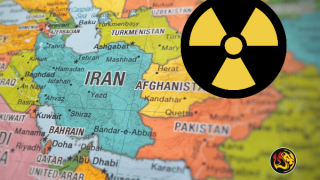by Emmitt Barry, with reporting from Worthy News Jerusalem Bureau Staff
LONDON/JERUSALEM (Worthy News) – Britain, France, and Germany moved Thursday to reimpose sweeping international sanctions on Iran, a step that European governments hope will pressure Tehran back into nuclear negotiations with the Trump administration.
The three European powers, known as the “E3,” stated that they triggered the sanctions “snapback” due to Iran’s “clear and deliberate” violations of the 2015 nuclear deal, the Joint Comprehensive Plan of Action (JCPOA). The U.S. abandoned the deal in 2018, but the E3, along with Iran, Russia, and China, remained parties to it.
The move begins a 30-day countdown after which Iran will again face United Nations-backed restrictions on banking, trade, weapons sales, and nuclear activities — sanctions that devastated its economy before the deal was struck. Diplomats acknowledged that if implemented, the measures would deal a final death blow to the JCPOA.
Iran’s foreign ministry blasted the decision as “unlawful” and vowed an “appropriate response.” Tehran’s Deputy Foreign Minister, Kazem Gharibabadi, warned that snapback would end talks with the U.N. nuclear watchdog over inspections. The International Atomic Energy Agency recently confirmed that Iran possesses enough highly enriched uranium to build around 10 nuclear weapons.
European diplomats accused Iran of stockpiling more than nine “Significant Quantities” of enriched uranium without civilian justification and blocking monitoring of critical sites, including Fordow and Natanz. “Iran’s nuclear program is a clear threat to international peace and security,” the E3 ministers wrote.
U.S. Secretary of State Marco Rubio welcomed the European decision, saying Washington would work with its allies to ensure “successful completion of the snapback.” He stressed that the U.S. remains open to direct talks with Tehran but warned that diplomacy requires “credible assurances” that Iran’s nuclear program is peaceful.
Under the snapback system, Russia and China cannot veto the return of sanctions at the Security Council. However, both nations have backed Iran’s claim that the Europeans lack legal standing to reinstate penalties. Analysts say while renewed sanctions may have limited immediate economic impact — with China likely to keep buying Iranian oil — they will further complicate Iran’s financial dealings and isolate it diplomatically.
Tehran has threatened to retaliate by withdrawing from the Nuclear Non-Proliferation Treaty, escalating the standoff. Some in Iran’s leadership advocate restraint, fearing an NPT exit could provoke further Israeli or U.S. strikes on its nuclear sites.
With a 30-day window before sanctions automatically snap back, diplomats expect frantic negotiations. The E3 said they could still delay the sanctions if Tehran takes “swift, tangible action” to restart talks, cooperate fully with inspectors, and account for its weapons-grade stockpile.
Copyright 1999-2026 Worthy News. This article was originally published on Worthy News and was reproduced with permission.
The following code is how the above article is generated with the Worthy Suite WordPress Plugin.
[worthy_plugins_news_story_body]This is how you display a story with an image.
Europe Triggers Snapback Sanctions on Iran Over Nuclear Breaches

by Emmitt Barry, with reporting from Worthy News Jerusalem Bureau Staff
LONDON/JERUSALEM (Worthy News) – Britain, France, and Germany moved Thursday to reimpose sweeping international sanctions on Iran, a step that European governments hope will pressure Tehran back into nuclear negotiations with the Trump administration.
The three European powers, known as the “E3,” stated that they triggered the sanctions “snapback” due to Iran’s “clear and deliberate” violations of the 2015 nuclear deal, the Joint Comprehensive Plan of Action (JCPOA). The U.S. abandoned the deal in 2018, but the E3, along with Iran, Russia, and China, remained parties to it.
The move begins a 30-day countdown after which Iran will again face United Nations-backed restrictions on banking, trade, weapons sales, and nuclear activities — sanctions that devastated its economy before the deal was struck. Diplomats acknowledged that if implemented, the measures would deal a final death blow to the JCPOA.
Iran’s foreign ministry blasted the decision as “unlawful” and vowed an “appropriate response.” Tehran’s Deputy Foreign Minister, Kazem Gharibabadi, warned that snapback would end talks with the U.N. nuclear watchdog over inspections. The International Atomic Energy Agency recently confirmed that Iran possesses enough highly enriched uranium to build around 10 nuclear weapons.
European diplomats accused Iran of stockpiling more than nine “Significant Quantities” of enriched uranium without civilian justification and blocking monitoring of critical sites, including Fordow and Natanz. “Iran’s nuclear program is a clear threat to international peace and security,” the E3 ministers wrote.
U.S. Secretary of State Marco Rubio welcomed the European decision, saying Washington would work with its allies to ensure “successful completion of the snapback.” He stressed that the U.S. remains open to direct talks with Tehran but warned that diplomacy requires “credible assurances” that Iran’s nuclear program is peaceful.
Under the snapback system, Russia and China cannot veto the return of sanctions at the Security Council. However, both nations have backed Iran’s claim that the Europeans lack legal standing to reinstate penalties. Analysts say while renewed sanctions may have limited immediate economic impact — with China likely to keep buying Iranian oil — they will further complicate Iran’s financial dealings and isolate it diplomatically.
Tehran has threatened to retaliate by withdrawing from the Nuclear Non-Proliferation Treaty, escalating the standoff. Some in Iran’s leadership advocate restraint, fearing an NPT exit could provoke further Israeli or U.S. strikes on its nuclear sites.
With a 30-day window before sanctions automatically snap back, diplomats expect frantic negotiations. The E3 said they could still delay the sanctions if Tehran takes “swift, tangible action” to restart talks, cooperate fully with inspectors, and account for its weapons-grade stockpile.
Copyright 1999-2026 Worthy News. This article was originally published on Worthy News and was reproduced with permission.
[worthy_plugins_news_story_title]
<div style="text-align:right; padding:0px 0px 10px 15px; float:right; width:300px;"><img src="[worthy_plugins_news_story_image name=sm_medium]" alt="" /></div>[worthy_plugins_news_story_body]